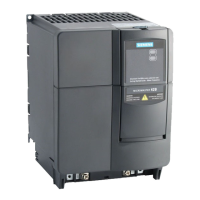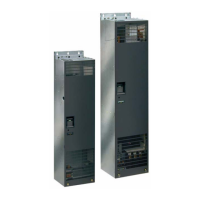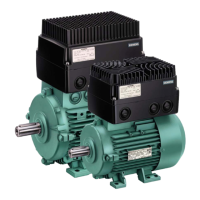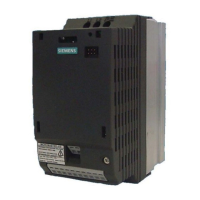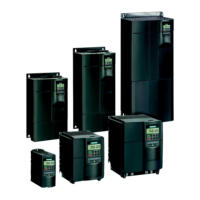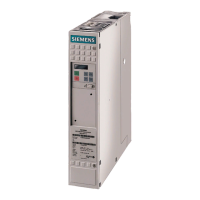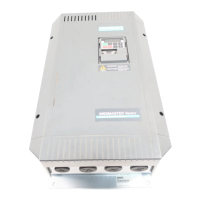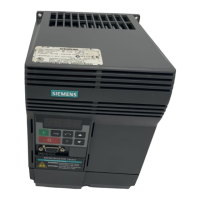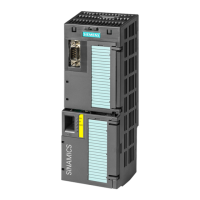© Siemens plc 1999© Siemens plc 1999
G85139-H1751-U529-D1G85139-H1751-U529-D1
The terminal arrangement for frame size C is similar to frame size AThe terminal arrangement for frame size C is similar to frame size A
Refer to Figures 2.2.1 and 2.2.3 and proceed as follows:Refer to Figures 2.2.1 and 2.2.3 and proceed as follows:
1. While supporting the fan housing with one hand, insert the blade of a screwdriver into slot A on the1. While supporting the fan housing with one hand, insert the blade of a screwdriver into slot A on the
underside of the inverter and press upwards to release the securing tab. Lower the fan housing, allowing itunderside of the inverter and press upwards to release the securing tab. Lower the fan housing, allowing it
to swing out to the right on its side-mounted hinges.to swing out to the right on its side-mounted hinges.
Applying pressure to the gland plate release clips B and C in the direcApplying pressure to the gland plate release clips B and C in the direc
tion of the arrows. Swing the plate outtion of the arrows. Swing the plate out
to the left on its side-mounted hinges.to the left on its side-mounted hinges.
Ensure that the power source supplies the correcEnsure that the power source supplies the correc
t voltage and is designed for the necessary t voltage and is designed for the necessary
. Ensure that the appropriate circuit-breakers with the specified current rating are connected. Ensure that the appropriate circuit-breakers with the specified current rating are connected
between the power supply and inverterbetween the power supply and inverter
(see section 8)(see section 8)
For the power input, use a 3-core cable For the power input, use a 3-core cable
for single phase units or a 4-core cfor single phase units or a 4-core c
able for three phase units. Forable for three phase units. For
the cross-section of each core see section 8.the cross-section of each core see section 8.
Use a 4-core Use a 4-core
screened cable to screened cable to
connect the motor.connect the motor.
Carefully measure and cut the cable Carefully measure and cut the cable
leads for power connections, motor connections leads for power connections, motor connections
and braking resistorand braking resistor
connections (if required) before feeding the screened cables through the glands in the metal gland plateconnections (if required) before feeding the screened cables through the glands in the metal gland plate
and securing the glands.and securing the glands.
Carefully measure and cut the cable leads for the control connecCarefully measure and cut the cable leads for the control connec
tions (if required). Feed the control cabletions (if required). Feed the control cable
through the correct gland and secure the gland to the metal gland-plate.through the correct gland and secure the gland to the metal gland-plate.
Connect the power input leads to the power terminConnect the power input leads to the power termin
als L/L1 - N/L2 (1 phase) or L/L1, N/L2, L3 (3 phase),als L/L1 - N/L2 (1 phase) or L/L1, N/L2, L3 (3 phase),
shown in Figure 2.2.1shown in Figure 2.2.1
) and torque down the screws.) and torque down the screws.
Connect the motor leads Connect the motor leads
to the motor terminals U, to the motor terminals U,
V, W and the earth (PE) (V, W and the earth (PE) (
shown in Figure 2.2.1shown in Figure 2.2.1
torque down the screws.torque down the screws.
For operation with cables longer than 25m see section 1.3.4For operation with cables longer than 25m see section 1.3.4
10.If required, secure Faston connectors to the 10.If required, secure Faston connectors to the
braking resistor leads and fit the braking resistor leads and fit the
connectors to the B+/DC+ andconnectors to the B+/DC+ and
B- terminals under the inverter.B- terminals under the inverter.
11.Connect the control leads as shown in Figures 2.2.4 and 2.2.611.Connect the control leads as shown in Figures 2.2.4 and 2.2.6
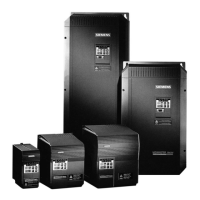
